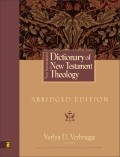When people ask me which Greek lexicon they should purchase, I try to get a feel for how well they know Greek. If they’ve studied the language and will be working directly with the Greek text, I recommend BDAG as the generally recognized standard New Testament Greek lexicon. If, however, they make it clear that they’ll primarily be studying in English and consulting a lexicon when doing New Testament word studies, I usually recommend The New International Dictionary of New Testament Theology (NIDNTT). NIDNTT is a little more accessible to the non-specialist because it is arranged by English theological concept rather than by Greek word, and most of the Greek is transliterated. Even more important, each entry explores the usage of Greek words in classical Greek, the Greek Septuagint, and the New Testament. Too often, people doing word studies focus on the etymology of a Greek word rather than the way it was actually used, and NIDNTT does an excellent job of correcting that in a way that makes sense to those for whom it is “still Greek to me.”

How does NIDNTT-A differ from NIDNTT? First, it is arranged by Greek word rather than by English concept. This brings it more in line with standard Greek lexicons. Second, each entry has a corresponding G/K Number, making it an ideal lexicon for those working with a Bible text tagged with G/K Numbers. The material that was removed from NIDNTT for the sake of abridgment includes bibliographic material, certain theological excursuses, Greek lexical entries which were repeated under various English entries, and some of the usage history from pre-Hellenistic Greek. In other words, the most relevant information is included in the abridged version, and you can go to the full lexicon when you need more depth, breadth, or links to relevant secondary literature. Finally, NIDNTT-A fills in some gaps in the original larger lexicon by adding entries for words that did not receive separate discussion.
If you’ve been wanting a lexicon which goes into more detail than the typical Strong’s number dictionary, have considered a larger lexicon like BDAG or NIDNTT to be overkill, or simply haven’t wanted to pay the prices associated with them, the abridged NIDNTT may be just what you’re looking for. We’re offering it for the rest of this month for just $30—a 25% savings. You can order it here.

